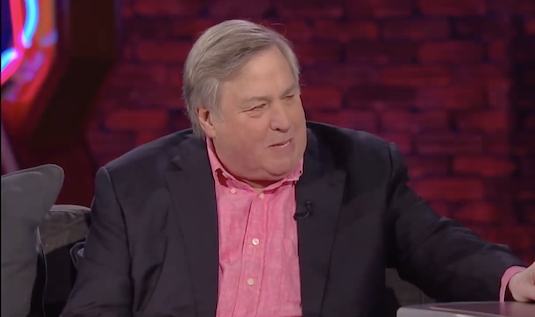A raft of failed predictions in 2012 sent Dick Morris into exile at Newsmax, which attempted one of its image rehab projects on him, which didn’t really take given his irrelevance over the past few years as a political pundit beyond Newsmax’s walls. While we weren’t watching (it seems he’s writing columns for Newsmax all this time), Morris has taken his pro-Trump sycophancy — as touted in a 2016 book published by Newsmax’s book division, Humanix — to the next level. In his Sept. 16 column, the headline sums up Morris’ suyck-up mode — “Key to Trump’s Victory — He Believes in America, Democrats Never Will”:
The Democratic National Convention opened the door for the Trump campaign to run on a central theme: Belief in America.
The dour pessimism which oozed from every portal at the Democrats’ convention sets up a beautiful contrast between the two candidates and their parties — optimism versus pessimism, That is, belief in America versus versus doubt over America.
Democrats believe the virus may conquer us.
Republicans believe we will conquer the virus.
Democrats predict a shaky economy at best and a prolonged recession at worst.
But Republicans believe the ongoing economic comeback will continue and, if Trump wins, accelerate.
[…]So the Trump Campaign should say to the Democrats, “How can you lead a country when you don’t believe in its future?”
Republicans should respond sounding this theme: “Believe in America and make it great again.”
The Biden campaign would rather make the race a personal referendum on Trump’s style, temperament, and personality. But the race will inevitably revolve around the Trump record and what it means for our nation’s future.
The Democratic strategy is to throw mud at Trump with an unending series of suggestive, titillating accusations and inferences from a plethora of books to keep the president in a permanent state of rage.
But the Trump campaign, by echoing a message of optimism can cut through that miasma.
[…]When we convert pessimists into optimists, we switch voters from Biden to Trump.
And, of course, when the vaccine arrives, its ballgame over.
On Sept. 28, Morris attempted a novel spin on Trump’s tax controversy:
Contrary to the false impression in The New York Times story, Donald Trump did not avoid taxes.
He pre-paid them.
In 2016 and 2017, he requested and got an extension to file his returns.
As required, he made an estimated tax payment of $1 million in 2016 and $4.2 million in 2017. Then, it turned out that he did not owe that much in taxes, but, rather than demand the money back, he let the IRS keep it and apply it to any future tax he owed.
So — when he only paid $750 in taxes for the first two years of his presidency it was because he had already overpaid during the two previous years and just reduced his payment by that amount.
Over the longer term, Trump overpaid his taxes by $72 million.
Because some of that overpayment was more than two years earlier, he was not allowed to offset it against current taxes. But Obama changed the law to allow taxpayers to go further back and he offset his tax liability in future years by citing his overpayment.
So Donald Trump did not avoid paying taxes, he prepaid them.
So what’s wrong with that?
Not much, aside from the fact that’s not what actually happened. Trump has been trying to get a $72 million tax refund since 2010 by claiming $1.4 billion in losses in 2008 and 2009; claiming losses to avoid paying taxes is a longtime Trump schtick.
Morris wasn’t done sucking up on the issue of taxes:
And, since no good deed goes unpunished in politics, the president also being skewered for taking a charitable tax deduction of $119 million for agreeing not to build homes on a 200 acre plot in Westchester, New York and a similar one in Los Angeles.
In each case, Trump bought the property planning to build a golf course and homes on them. Both times, the local zoning board refused to allow the development.
So Trump donated the right to develop develop this land to charity and took a deduction of $119 million, called a charitable easement.
So now the beautiful land in each location will be preserved forever wild as a place of refuge for people, birds, and animals.
Again, Morris is censoring the shady part of the controversy about the New York property known as Seven Springs:
Trump failed to develop the property after neighbors fought back so he took advantage of a historic conservation easement provision that allowed him to claim a $21 million charitable tax deduction when he signed a deal not to develop most of the property. He has also written off millions in property taxes as a business expense, classifying Seven Springs as an investment property rather than a personal residence, even though the Trumps appear to have used the sprawling estate as a summer “compound” and “retreat for the Trump family” for years.
Trump’s tax records show that about $119 million of the $130 million in charitable contributions reported to the IRS have come from the Seven Springs scheme. The Seven Springs deduction is under investigation by New York’s attorney general.
Morris concluded by invoking the right-wing defense of Trump on the tax issue: “He took advantage of every way to cut his tax burden. Do you know any taxpayer who doesn’t?”
